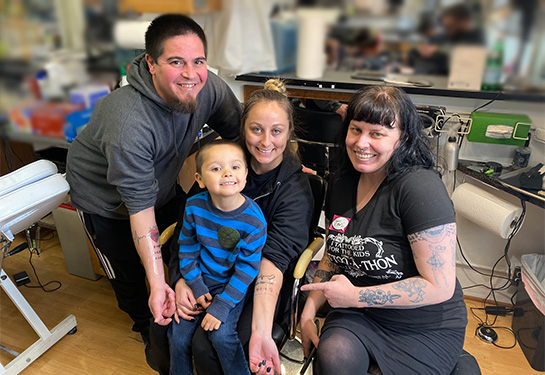Supporting employees: Bringing menopause discussions to work
UC Davis employees share their experiences about living with perimenopause and menopause

For years, women whispered about hot flashes, brain fog, and sleepless nights — but now, they’re finding support and speaking up, asking that workplaces and teammates recognize menopause as more than a private struggle.
Even if you haven’t personally experienced these transitions, they likely impact you through your relationships with colleagues, family, and friends. Perimenopause and menopause symptoms affect 85% of people who have or had periods and can vary from mild to severe.
To help raise awareness about these big life transitions, 40 women from the UC Davis Meno-power Interest Group share their lived experiences with perimenopause or menopause via an anonymous Qualtrics survey.
The symptoms go far beyond hot flashes
The survey revealed that there is no fixed description of perimenopause and menopause symptoms. These effects can begin when one is as young as 30 – and may last for years or even decades. For some, the transition is barely noticeable; for many, however, it’s completely life-altering.
Common experiences mentioned by participants include hot flashes, night sweats, disrupted sleep, joint pain, thinning hair, brain fog, mood swings, anxiety, bloating, and memory loss – and numerous others. Many women describe days where they feel like strangers in their own skin – unable to concentrate, struggling with fatigue, and feeling emotionally raw. Several also recount feeling isolated, fearing judgment from coworkers or supervisors, and worrying that others might see them as less capable simply because their bodies and minds are changing.
Anyone – whether or not you identify as female – would find the aforementioned symptoms extremely uncomfortable.
One participant shared, “All of us show up to work wanting to give 100 percent, but the struggle is real. Giving our best looks different depending on how our body adjusts each day. We care about contributing as valued members, but we worry about judgment from coworkers.”
Concealing life transitions can cause harm
Many women mentioned feeling forced to conceal their symptoms to avoid stigma, which undoubtedly adds unnecessary stress and a greater sense of isolation. The pressure to "keep up appearances" is real and exhausting.

One participant said, “At work, I have struggled with energy, focus, and hot flashes while teaching classes. I feel unsupported because I cannot rest or end my day when I need to. I have to push through when I need breaks or work hard when my mind can't focus. All the stress from work correlates to hot flashes, night sweats or waking at night. I can tell because I have watched my patterns over the last year and a half.”
Another participant shared, “I’ve consistently felt the need to conceal or minimize my perimenopause symptoms, and to be honest, I still don’t talk about it. It wasn’t until menopause started gaining attention on social media that I even began to understand what was happening to me or what to expect. Before that, I felt ashamed and isolated. People made jokes about my hot flashes, so I did my best to hide them. But do you know how difficult it is to pretend everything is fine when sweat is pouring down your face in a cold, air-conditioned room? This silence continues to affect me.”
Living the values of kindness, trust, inclusion
The feedback from the survey is clear – women want workplaces where they can be honest about what they’re experiencing, without fear of ridicule or repercussions. Suggestions such as flexible schedules, wellness resources, desk fans, and room temperature control are easy and reasonable accommodations that can make a vast difference. But more importantly, it's about creating an environment where menopause is normalized – not whispered about, dismissed or even disrespected.
While it wasn’t reported as the norm, some women noted that their managers demonstrate empathy and support during this life transition.
One participant said, “My boss has been incredible, she allows us to work from home two days a week and this makes the world of difference.”
Building a culture of empathy – not just for menopause, but for any life challenge – makes workplaces healthier and more inclusive for everyone. According to the Society for Human Resource Management, 92% of surveyed employees said they’d look for organizations that demonstrated empathy.
When asked about meaningful changes that could help make the workplace better, another participant shared, “If I could suggest one simple change to make the workplace more menopause-inclusive, it would be to normalize open and compassionate conversations about it. Creating space for education and awareness, through brief trainings, resource sharing, or manager toolkits would help reduce stigma and increase understanding.”
She added, “When people feel safe talking about what they’re experiencing without embarrassment or fear of judgment, it fosters empathy, flexibility, and a more supportive environment for everyone.”
Key takeaways
- Perimenopause and menopause are not just personal journeys – they are shared workplace experiences that deserve recognition and respect.
- Flexible scheduling, wellness resources, desk fans, and temperature control can greatly help.
- Menopause should be normalized – not ignored or mocked.
- Meaningful change starts with open, compassionate conversations.
- Brief trainings, resource sharing, and manager toolkits can reduce stigma and increase understanding.
- When employees feel safe to discuss their experiences, it fosters empathy, flexibility, and support for all.
To learn about ways to normalize menopause, read Dr. Laura Fejerman’s 10-23-25 leadership message
Click here for more information about the UC Davis Meno-power Interest Group





